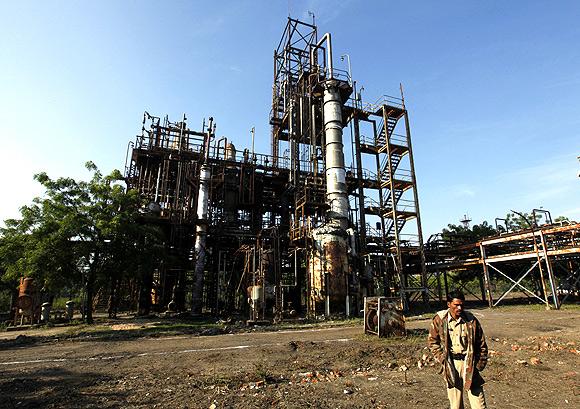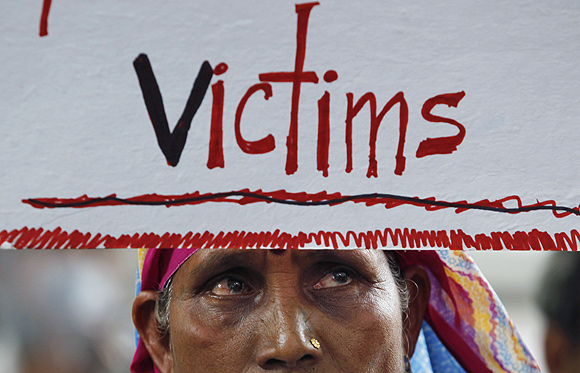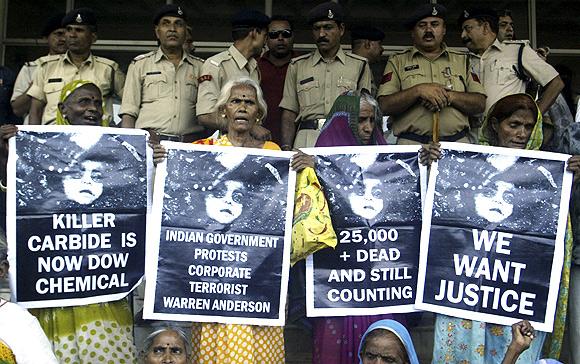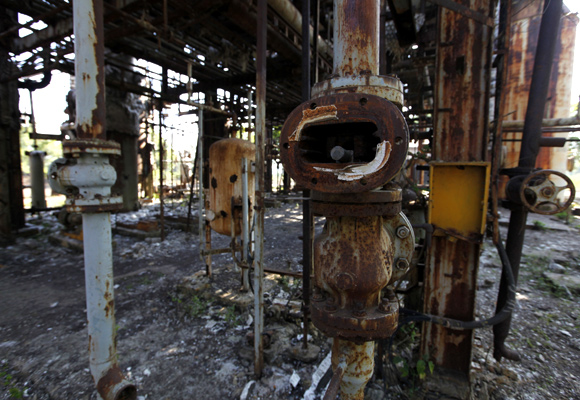
A bus-borne museum will take the experiences of Bhopal gas victims round the country, says Rrishi Raote
Just like we go to Hiroshima, Chernobyl and Ground Zero in New York to remember and pray for victims," said Babulal Gaur in 2009, "so many people from around the world want to visit the Bhopal Union Carbide factory to learn about the disaster."
Gaur was then minister of relief and rehabilitation for victims of the gas leak of December 3, 1984, and he was justifying a decision to open the factory site to tourists in the disaster's 25th anniversary year.
The announcement triggered an uproar and the government did a quick U-turn.
Rama Lakshmi, a museologist and reporter for a United States newspaper, recounts the protesters' argument, "There are pending issues. First address the issue of toxic materials, underground water pollution -- address these issues and then think about a museum."
But the incident raised a long-term question, as Lakshmi says. "Will they [that is, the government via an official museum] sanitise the story? The story didn't just begin on December 3 and end on December 4. It is continuing."
Click on NEXT for more...

The solution, she says, was a museum of and by the victims. This museum is to be mobile as well as flexible, visitors will participate and not passively absorb. It will be housed in a bus. Lakshmi is helping to curate it, but it is organised by a trust of a few survivors, activists and an artist.
This "people's" museum is being built around things owned and used by the victims, survivors and campaigners at the time of the disaster and in the years since. Here is a sari, given to Bano Bi by her husband a few hours before he was killed. She has never worn it.
Here are bangles, clothes, spectacles worn by other victims and kept by their families. Each item will be accompanied by a recording by the donor telling why the item is important.
"People here are not seen as history-makers, as witnesses to history," says Lakshmi.
Instead, Indian museums suffer from what she calls, in a recent edition of Curator journal, "a cult of expertise, a sort of Brahminical monopoly over knowledge, a mistaken belief that sharing it or breaking it down for the commoner would diminish its significance and perhaps, even its purity". The communication is all one-way.
Click on NEXT for more...

This is in contrast to the USA, where Lakshmi has worked as a museologist on subjects like racial segregation and people with disabilities. She says deaf people who use sign language refuse to be "disabled", saying they are instead a linguistic minority.
There are collections of ephemera like wheelchairs and hearing aids, which record how the technology that shapes these tools changes and responds to social cues -- thus, new hearing aids are cochlear implants invisible from outside, preserving the fiction that the user is "normal".
In India, the bus museum also aims to create a new normal. If the peedit (injured) of different parts -- such as, Lakshmi says, those affected by endosulfan in Kasargod or water pollution in Ludhiana -- can see and hear the experiences of others, they can learn from them.
So the bus will visit 15-20 locations, and will also carry items associated with the movement, like the chains with which protesters attached themselves to the fence of Race Course Road in Delhi in 2008, the notes they wrote, the placards they held, the effigies they burnt and the clothes they wore.
Click on NEXT for more...

Rasheeda Bi of the Bhopal Gas Peedit Mahila Stationery Karamchari Sangh is helping collect the exhibits.
"We want to show what an awful night it was," she says. "We have to prove why there should be no more Bhopals."
They have pens, wood that a carpenter was working on, a sewing machi#8800 children's toys, clothes, milk bottles; leg braces used by malformed children in the years since.
"The parents kept these things very carefully," says Rasheeda Bi, but "they gave happily."
There are 100-150 items, she says.
"We made a small museum in our office in 2007," she says. "After Rama came we got strength and started collecting more."
The cost of the bus museum and tour, Lakshmi estimates, will be Rs 60-65 lakh. It will partly be met by a survivor's donation of his compensation. The bus is expected to leave on the 28th anniversary of the disaster, in 2012, and return after one year.
Click on NEXT for more...